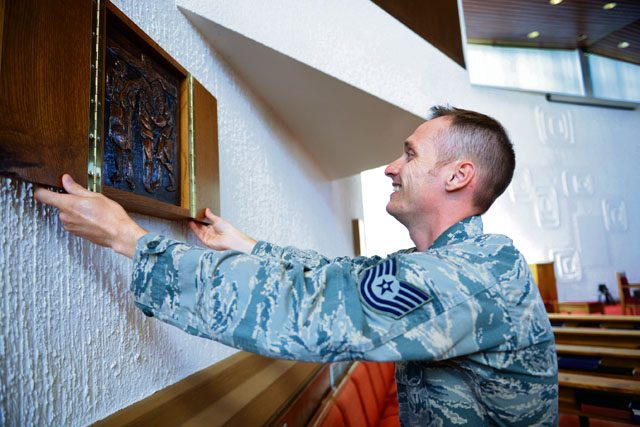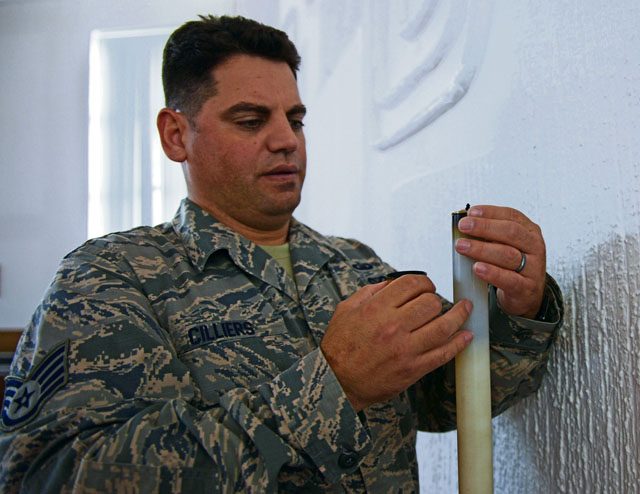
Spiritual fitness doesn’t necessarily mean ensuring you regularly go to a personal place of worship. Ramstein’s religious support teams — one chaplain and one chaplain assistant — are on standby to assist Airmen in crisis, who need religious support, or who just want to talk things out without fear of retribution.
“We’re here for the Airmen,” said Capt. Sharior Rahman, 86th Airlift Wing chaplain. “I have atheists that come to me for counseling; I also have Buddhists, Christians, Muslims — a wide range. Now, I may be a pastor, an imam, a priest or a rabbi just to my faith group, but I am a chaplain to all.”
Chaplains are bound by a policy of 100 percent confidentiality, which benefits Airmen and their families who may not want anyone else to know what they are going through.
Even when chaplains conduct their unit visitations, they cannot report specific incidents or specific people to the unit commander; they can only give general information to the commander, Rahman added.
“We do a lot of visitations, but we also advise leadership,” Rahman said. “We make it a point to get on the commander’s schedule, such as going to staff meetings; basically know what’s going on. You can’t disclose names and you can’t disclose what’s going on, but you can tell the commander, ‘I see a tendency for such and such behaviors occurring.’”
RSTs are indispensable in supporting the morale and spiritual welfare of a unit, Staff Sgt. Johannes Cilliers, 86th AW chaplain assistant said.
“The writing’s (on) the wall,” Cilliers said. “If there’s not a chaplain or chaplain assistant, know that morale will not be high. If your spirituality is lacking, sooner or later the physical and mental will collapse as well.”
Rahman noted that it’s important for a chaplain and chaplain assistant to work together, especially given the possible barriers between officers and enlisted personnel. This working relationship must be properly maintained in order to be able to minister effectively, he said, recalling his experience when he was at Joint Base San Antonio-Lackland, Texas. Basic military trainees would become nervous when an officer approaches.
“At basic training, new recruits into the Air Force are drilled constantly the difference of an officer and enlisted whereupon they even salute a poster of an officer outside their chow hall line,” Rahman said. “The first thing they see is not the chaplain insignia, the first thing they see is the rank. It can build walls, and they’re not easily apt to open. If you have a chaplain assistant who is enlisted like them, they may be more apt to open up to them.”
Even though RSTs are heavily engaged at home station, their mission of serving the Airmen’s spiritual needs extends to deployed locations as well. Cilliers said being deployed as an RST can be an advantage, explaining that the separation from the extra duties and responsibilities at home base allows them to focus more on ministering to the Airmen. Another benefit, Cilliers added, is that chaplains and chaplain assistants can work at a closer level since they are deployed to the same location and work longer shifts.
“You share a dining facility together, you walk down the street in between the tents, you see people and interact with them,” Cilliers said. “It’s not like people who jump in their car and go home; you stay where you are.”
Religious support teams are sometimes called upon to serve those who have bravely faced some harsh realities of war, Cillers said. An RST’s task descriptions may have a wide range; apart from counseling Airmen and advising leaders, RSTs also make sure the chapel facility is kept in good condition, conduct retreats for married couples and singles and even prepare food for base events.
However, these different tasks have a focus: the Airmen and their families, Cilliers said.
“There are several duties which go along with it, but if I have to sum it up in one sentence, it’s taking care of our Airmen,” Cilliers explained. “That doesn’t mean just junior enlisted, that means all of us from airman basic to general; we all are Airmen, and we need to be taking care of the spiritual needs of those Airmen.”
While Rahman and Cilliers may have different duty titles and different ranks, they both have the same reason for doing what they do: the desire to help people.



